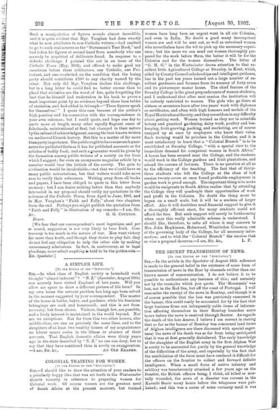COLONIAL TRAINING FOR WOMEN.
[TO THE EDITOR OF TUC "SPECTATOR."]
SIR; I should like to draw the attention of your readers to a peculiarly happy idea that was set forth in the Westminster Gazette recently in reference to preparing women for Colonial work. Of course women are the greatest need of South Africa at the present moment, but trained women have long been an urgent want in all our Colonies, and• even in India. No doubt a good many incompetent women are and will be sent out, as well as untrained women who nevertheless have the wit to pick up the necessary experi- ence; but the more we can send out women thoroughly pre- pared for the work before diem, the better it will be for the Colonies and for the women themselves. The letter of " G. M. G." in the Westminster draws attention to that ex- cellent little Agricultural College at Swanley, in Kent, which, aided by County Council scholarships and intelligent guidance, has in the past ten years turned out a large number of ex- cellent gardeners and farmers from its nursery of forty acres and its picturesque manor house. The chief feature of the Swanley College is the great preponderance of women students, and I understand that after next session the institution will be entirely restricted to women. The girls who go there at sixteen or seventeen leave after two years' work with diplomas or certificates, and often with high honours and medals of the Royal Horticultural Society, and they are seldom in any difficulty about getting work. Women trained as they are in scientific botany and practical gardening, dairy work, poultry and bee- keeping, fruit-growing, packing, and marketing, are of course snapped up at once by employers who know their value. Such training would be priceless in the Colonies, and it is most satisfactory to learn that a " Colonial Branch " is to be established at Swanley College, " with a special view to the immediate demand for competent women in South Africa." A house has been secured near the College, and the students would work in the College gardens and fruit plantations, and attend the courses of lectures. There is no question at all as to the efficiency of the teaching. The fact that of thirty- three students who left the College at the close of last session twenty-seven at once found profitable employment in garden work is proof enough. The important thing is to make would-be emigrants to South Africa realise that by attending the College they will quadruple their opportunities of work and profit in the Colonies. No doubt the thing must be begun on a small scale, but it will be a nucleus of larger effort. Also it will doubtless need financial support to give it a thoroughly efficient start, for many students could not afford the fees. But such support will surely be forthcoming when once this really admirable scheme is understood. I should like, therefore, to refer all whom it may concern to Mrs. John Hopkinson, Holmwood, Wimbledon Common, one of the governing body of the College, for all necessary infor- mation; and to wish the "Colonial Branch" the success that
so wise a proposal deserves.—I am, Sir, &c., L. P.






































 Previous page
Previous page